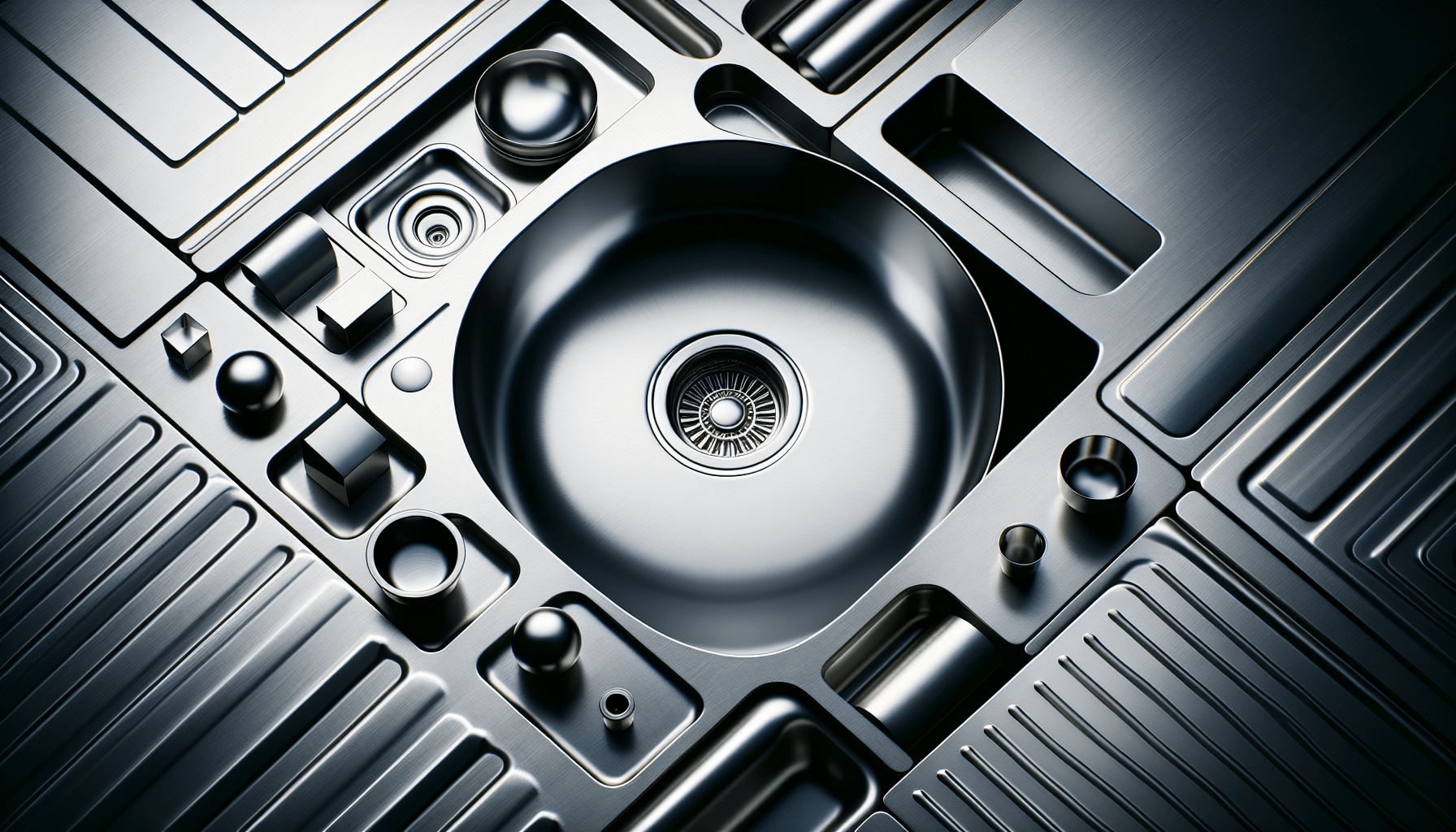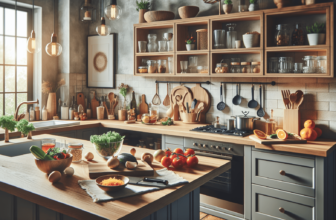
In the world of kitchen sinks, there is an abundance of choices when it comes to materials. Each material brings along its own set of advantages and disadvantages that can greatly impact your overall kitchen experience. From the sleek and modern stainless steel to the elegant and timeless porcelain, it’s essential to understand the pros and cons of each material before making a decision. Whether you’re a cooking enthusiast or someone who simply wants a functional and durable sink, this article will provide a comprehensive overview of the various kitchen sink materials and help you make an informed choice that suits your needs.
Stainless Steel
Pros of Stainless Steel:
Stainless steel sinks are a popular choice for many homeowners, and for good reason. One of the major advantages of stainless steel sinks is their durability. They are resistant to scratches, stains, and rust, making them perfect for heavy daily use. Stainless steel is also a hygienic material, as it does not harbor bacteria or germs, making it a safe and clean option for your kitchen.
Another advantage of stainless steel sinks is their versatility in terms of design. They come in a variety of shapes, sizes, and finishes, allowing you to find the perfect sink that matches your kitchen aesthetic. Additionally, stainless steel sinks are known for their affordability, making them a budget-friendly option for homeowners.
Cons of Stainless Steel:
While stainless steel sinks have numerous advantages, they also have a few drawbacks to consider. One of the main concerns with stainless steel sinks is their tendency to show water spots and fingerprints. This can require frequent cleaning and maintenance to keep the sink looking its best.
Another drawback is the potential for noise. Stainless steel sinks can be noisy when dishes and utensils are placed or dropped into them, as stainless steel is a relatively thin material. However, some manufacturers offer sound-deadening coatings or pads to help minimize noise.
Cast Iron
Pros of Cast Iron:
Cast iron sinks are known for their durability and longevity. They are resistant to chipping, scratching, and staining, making them a reliable option for a busy kitchen. Cast iron sinks also have excellent heat retention, which means they will keep water warmer for longer periods of time compared to other materials. This can be beneficial for tasks such as washing dishes or soaking pots and pans.
Additionally, cast iron sinks offer a classic and timeless appeal, making them an attractive choice for many homeowners. They are available in a wide variety of colors and finishes, allowing you to perfectly match your sink to your kitchen décor.
Cons of Cast Iron:
Despite their durability, cast iron sinks are prone to chipping and cracking if heavy objects are dropped into them. This can lead to costly repairs or even the need for a complete replacement. Cast iron sinks also require regular maintenance and cleaning to prevent staining and to keep their finish looking pristine.
Another consideration with cast iron sinks is their weight. Cast iron is a heavy material, which means installation may require additional support and reinforcement. It is important to take this into account when choosing a cast iron sink, as it may affect your overall kitchen design and layout.
Composite
Pros of Composite:
Composite sinks, made from a mixture of materials such as quartz or granite particles and resin, offer homeowners a sink that combines the best features of different materials. One of the major advantages of composite sinks is their durability. They are resistant to scratches, stains, and heat, allowing them to withstand the demands of a busy kitchen.
Composite sinks also come in a wide variety of colors and finishes, making them a versatile option that can complement any kitchen style. They are easy to clean and maintain, and the non-porous surface prevents the growth of bacteria and germs.
Cons of Composite:
While composite sinks have many benefits, they also have a few drawbacks to consider. One of the main concerns with composite sinks is their susceptibility to discoloration over time. Prolonged exposure to certain chemicals or heat can cause the sink to fade or lose its original color.
Additionally, composite sinks may not be as resistant to impact as other materials. They can be prone to chipping or cracking if heavy objects are dropped into them. It is important to exercise caution and handle items carefully to avoid damaging the sink.
Fireclay
Pros of Fireclay:
Fireclay sinks offer a unique and elegant look to any kitchen. They are made from a combination of clay and glaze, which creates a smooth and glossy finish. Fireclay sinks are known for their durability and resistance to staining and scratching. They can withstand high temperatures without damage, making them perfect for regular use in a busy kitchen.
Fireclay sinks also offer excellent hygiene properties. The non-porous surface prevents the growth of bacteria and allows for easy cleaning and maintenance. Additionally, fireclay sinks are available in a variety of styles and colors, allowing homeowners to choose a sink that complements their kitchen design.
Cons of Fireclay:
Fireclay sinks, while highly durable, can be prone to chipping or cracking if heavy objects are dropped into them. It is important to handle items with care to avoid any damage to the sink. Additionally, fireclay sinks are typically more expensive than other options, which can be a determining factor for budget-conscious homeowners.
Another consideration with fireclay sinks is their weight. They are heavy and may require additional support during installation. It is essential to ensure that your cabinets can bear the weight of the sink to prevent any structural issues in the future.
Copper
Pros of Copper:
Copper sinks offer a unique and striking visual appeal to any kitchen. They develop a natural patina over time, giving them a timeless and rustic look. Copper sinks are known for their durability and resistance to stains, scratches, and bacteria. They are also highly heat-resistant, making them ideal for tasks such as washing hot pots and pans.
Copper sinks are also eco-friendly, as copper is a recyclable material. They are often handcrafted, providing homeowners with a truly unique and artisanal piece for their kitchen. Additionally, copper has natural antibacterial properties, which can contribute to a cleaner and healthier kitchen environment.
Cons of Copper:
One of the main concerns with copper sinks is their susceptibility to scratching and dents. Copper is a softer material compared to other sink options, and this can make it more prone to damage. However, over time, these imperfections can add to the character and charm of the sink.
Copper sinks also require regular maintenance to prevent the development of a green patina. If you prefer the bright and shiny appearance of copper, you will need to polish and clean the sink regularly to maintain its original look. Additionally, copper sinks tend to be more expensive than other materials, which may need to be taken into consideration when budgeting for a kitchen renovation.
Granite
Pros of Granite:
Granite sinks offer a combination of beauty and durability to any kitchen. They are made from natural granite stone, which gives them a luxurious and high-end appearance. Granite sinks are resistant to stains, scratches, and heat, making them perfect for daily use in a kitchen. They are also highly durable and can withstand the demands of a busy household.
Granite sinks come in a variety of colors and patterns, allowing homeowners to choose a sink that matches their kitchen décor. They are easy to clean and maintain, and the non-porous surface makes them hygienic and resistant to bacterial growth.
Cons of Granite:
One consideration with granite sinks is their weight. They are heavy and may require additional support during installation. It is important to ensure that your cabinets and countertops can bear the weight of the sink to prevent any structural issues in the future.
Additionally, granite sinks can be prone to chipping or cracking if heavy objects are dropped into them. It is important to handle items carefully to avoid any damage. Granite sinks also tend to be more expensive than other options, which may be a factor to consider when planning your kitchen renovation budget.
Porcelain
Pros of Porcelain:
Porcelain sinks offer a classic and timeless look to any kitchen. They are made from clay and coated with a layer of porcelain, creating a smooth and glossy finish. Porcelain sinks are known for their durability and resistance to stains, scratches, and fading. They can withstand high temperatures without damage, making them perfect for regular use in a kitchen.
One of the advantages of porcelain sinks is their ease of cleaning. The non-porous surface prevents the growth of bacteria and germs, ensuring a hygienic environment. Porcelain sinks are also available in a wide variety of colors and styles, allowing homeowners to find the perfect sink to complement their kitchen design.
Cons of Porcelain:
Despite their durability, porcelain sinks can be prone to chipping or cracking if heavy objects are dropped into them. It is important to handle items with care to avoid any damage. Porcelain sinks can also show water spots and stains more easily compared to other materials. Regular cleaning and maintenance are necessary to keep the sink looking its best.
Another consideration with porcelain sinks is their weight. They are heavy and may require additional support during installation. It is essential to ensure that your cabinets can bear the weight of the sink to prevent any structural issues in the future.
Natural Stone
Pros of Natural Stone:
Natural stone sinks, such as marble or travertine, offer a luxurious and elegant look to any kitchen. They are crafted from solid slabs of natural stone, giving them a unique and timeless appeal. Natural stone sinks are highly durable and resistant to chipping, scratching, and heat. They can withstand daily use in a busy kitchen without losing their beauty.
One of the major advantages of natural stone sinks is their aesthetic value. Each sink is uniquely patterned and veined, making it a focal point in the kitchen. They come in a variety of colors and finishes, allowing homeowners to choose a sink that matches their personal style.
Cons of Natural Stone:
Natural stone sinks, while beautiful, require regular maintenance and care to preserve their appearance. They can be susceptible to stains and discoloration, especially if exposed to acidic substances. It is important to clean spills promptly and use appropriate cleaning products to prevent any damage to the sink.
Additionally, natural stone sinks tend to be more expensive than other options. The high-quality materials and craftsmanship contribute to their higher price point. This may need to be taken into consideration when planning your kitchen renovation budget.
Acrylic
Pros of Acrylic:
Acrylic sinks offer a lightweight and affordable option for homeowners. They are made from a synthetic material called acrylic, which is highly durable and resistant to stains, scratches, and heat. Acrylic sinks are easy to clean and maintain, making them a practical choice for a busy kitchen.
One of the major advantages of acrylic sinks is their versatility in terms of design. They come in a wide variety of shapes, sizes, and colors, allowing homeowners to find the perfect sink that matches their kitchen aesthetic. Acrylic sinks can also be easily repaired if they become damaged.
Cons of Acrylic:
One consideration with acrylic sinks is their susceptibility to scratches and dents. While they are durable, heavy objects or sharp utensils can leave marks on the surface. It is important to handle items with care and use cutting boards or mats to protect the sink.
Acrylic sinks can also be prone to discoloration over time if exposed to certain chemicals or heat. It is important to avoid using abrasive cleaners or placing hot pots and pans directly on the sink surface. Regular cleaning and maintenance will help prolong the lifespan and appearance of an acrylic sink.
Glass
Pros of Glass:
Glass sinks offer a contemporary and stylish look to any kitchen. They are made from tempered glass, which is highly durable and resistant to cracks and scratches. Glass sinks are non-porous and hygienic, preventing the growth of bacteria and germs. They are easy to clean and maintain, making them a convenient choice for a busy household.
One of the major advantages of glass sinks is their aesthetic appeal. They come in a variety of colors and designs, allowing homeowners to create a unique and modern look in their kitchen. Glass sinks can also be illuminated from beneath, creating a stunning visual effect.
Cons of Glass:
While glass sinks have many benefits, they also have a few considerations to keep in mind. One concern is their susceptibility to water spots and fingerprints. Glass surfaces require regular cleaning to maintain their clarity and transparency.
Glass sinks are also prone to chipping or cracking if heavy objects are dropped into them. It is important to handle items with care to avoid any damage. Additionally, glass sinks may not be suitable for households with young children or pets, as they can pose a safety risk if broken.
In conclusion, there are numerous factors to consider when choosing a kitchen sink material. Stainless steel and cast iron offer durability and versatility, while composite and fireclay sinks provide a blend of performance and aesthetics. Copper and granite sinks offer a unique and luxurious appeal, while porcelain and natural stone sinks provide a timeless and classic look. Acrylic sinks offer affordability and versatility, while glass sinks offer a contemporary and stylish design. Ultimately, the choice of kitchen sink material will depend on individual preferences, budget, and lifestyle factors. It is important to weigh the pros and cons of each material to find the sink that best suits your needs and enhances your kitchen space.






